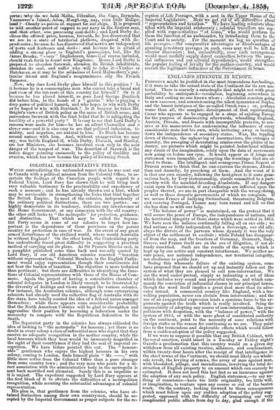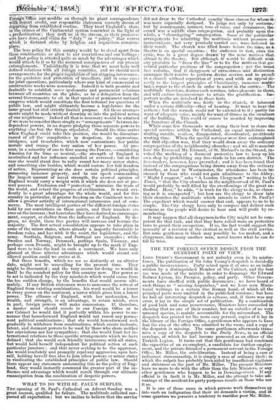EINGLAND'S:011ENGTII 1i J t OPE.
PROPHECY Lmight.be‘iuStige OPPAtitgnfIRSIR3/4144.forebodings, if it were-te take the oetuallStatssig-the.CroAtinent,for its raw ma- terial. !There in racareely a eatoatrophe that 'might not with great probability ,be_alitieipa -- tedrnyoNtion laeginning somewhere in Italy-and :ending tone,hnowaiiwhene ; isAbsoligist reaction going to new ,ezepsses, tiftdslienntennl4fingittleAili*ItitiY.X0xmies of Naples, and the basest hatriguesnofothesgetea,lled,Gnrels,raee ; or, perhaps worse than all,. ,the ,onmpletenlloyolepraent:Of that, equivocating Caesar who:appeare..tet ho engaged ip a stage of cajoling Europe for the ,purpoSts of/domineering eftlerwar4, wheedling England, Austria, • Prussia*, itml, A489ia. WWI incompatible pretexts, to con- nive at his .manceustres for uuderminingthe iufluence of every considerable. atateebur his own, while bartering, away or beating down the independence a..seooutlary states. War, the toppling down of thrones, the mpheasing of insurrections, the outrages of anarchy, the sweeping of devastating axmiersever tho,plains of-in- dustry; are pictures which anight he, paiotedqheforehand. without any strain of the imaginationosolay upon the clata-Rf movements now goingi on befora our eyes.--.,IItrWould.lappear aal if kings and statesmen' were ineap.able,ofismeteptietaWirelmins that are of- fered to them. The intelligentriand,00urageous.Prince. Regent of Prussia seems to think 'that ,be:leansexorcise the demons, Absolu- tism and Anarchy, by preaching at. them. And -the werst of it is that our own country, folloWing the bent given to it some gene- rations back, by Tory.statesoutiaship,,atands emitted to ft p4st- nership with the mischief-breedkng'Absolutiate. If any -dangers upon exist the Continent, if any, sufferings are inflicted upon the peoples thereof, we are in part-chargeable with the wrong-doing, as well as those despotic governments, of which we complain. If we accuse France of. bullying Switzerland, threatening Belgium, and coercing Portugal, France may turn round and tell us that she has done so with our help.
"The balance of power" is maintained, on the pretext that it
will secure the peace of Europe, the independence of nations, and the territorial integrity of those states which:were settled in 1815. We have seen the balance continually falling all on one side; we find nations so little independent, that a Sovereign, our old ally, obeys the dictate of the parvenu whose dynasty it was the very object of the settlement to exclude; while Poland has disappear- ed from the map, and the frontiers of Germany, Denmark, Italy, Greece, and France itself are on the eve of litigation, if not al- ready unsettled. Such are the results of the, system which is kept up by our active and constant interference. We neither as- sure peace, nor national independence, nor territorial integrity, nor obedience to public law. Seeing this whosesale failure of the existing system, some have proposed that we should set up and instantly follow out the system of what they are pleased to call non-intervention. We use the word under protest, simply as indicating a set of ideas which includes very sound and powerful truths, and which com- mands the conviction of influential classes in our principal towns, though the word itself implies a great deal more than its advo- cates intend. A commercial country' like England, with a. tra- velling population, never can abstain from intervention; and the use of an exaggerated expression lends a spurious force to' the ar- guments against the truth which is really' involved. Seing the impossibility of adopting any course of non-intervention, the sym- pathizers 'with despotism with the "balance of power," with the system of 1815, or with the mere ghost of constituted authority on the continent, point to the necessity of some relations with foreign states as the reason for continuing as we are. They point also to the tremendous and deplorable effects which would. follow from a sudden adoption of the policy suggested.
If we were to suppose it possible that any British Cabinet, with
the royal sanction, could insert in a Tuesday or. Friday night's Gazette a proclamation that this country would on a given day withdraw from all existing treatise, alliances, and combinations, within twenty-four hours after the receipt of 'that intelligence in the chief towns of the Continent, we should most likely see whole- sale revolt, the levying of armies, the array of man against man, with bloodshed, pillage, and incendiarism, involving the total de- struction of English property to an amount which can scarcely be estimated. It does not need this last fact as an insurance against the adoption of any such policy. English statesmen,—to say no- thing of conscience—have too little originality, too little will, or imagination, to venture upon any course so out of the beaten track. On the contrary, looking forward to those consequences which must follow upon any sudden adoption of the policy sug- gested, oppressed with the difficulty of transacting our very ,complicated public affairs from day to, day, glad enough if the .•°,9tirdc'e Can muddle on through its giant correspondence `fent credit, our responsible statesmen scarcely dream of
•
dv, lig from established routine. They treat England's share :orxmes of the Continental system somewhat in the light of aizref •Stination; they drift on in the stream, as their predeces-
flors have done and claim for "duty" " policy," that coursa which is dictated alone by helpless and sequaeions common- place:
The true policy for this country would be to stand apart from these combinations so alien to our convictions and mirleelings ; and that policy is attested quite as midi- by the advantages which would attach to it as by the accursed consequences of our present entanglements. Jrndoubtedly:it is trim that we must have well definectre/ations iii4th all fereign countries, and we should need arrangements for ,the proper çguatiou of our sliipping intercourse, for theguidance and prat cin of travellers, and' in some cases for jclitit Operations, partieularly where ally kind oftommereial,Or construetisie works 'wereneceSsary.. Indeed it is both' possible and desirable to establish :snore systeniatic and permanent relations between all countries on the -globe,' as by a deleention from the several Governtaents to sit in that species of perilinent.national congress which' would constitute the first tribunallor questions at public la*, and might nitiniately beebrae- it legislature for the aline grand.but still strictly limited purpose. A.11•these arrange- menta'reiglit be madeoWithoist drawing us into 'the politicalaction of our neighbours: Indeed all that is neeessary:would be attained if we were to consider these simply as "arrangements" between in- dependent powers, in no degree pledging those separatepowers to 'anything else but the things stipulated. Should the time arrive when England could take this position, rho would:be disembar- rassed of all the complicities in despotism ; its oppressions, intrignes, and treacheries, which now contaminate •i her public morale' and cramp; the -Very *action of • her power.. At 'pre- sent, in aMinority of One to four among the Powers,considering America for the time ass-rieutral,—the strength Of England- is neutralized and her influence annulled Or• reversed ; but in that inSeshe 'would stand free to rally round her ninny minor states, Mittadinething else besides, which would restore her full freedom Representing-as she -does certain political principles, pOsiessing immense property, - and in our epoch commanding the largest amount of naval strength, the avowed opinion of E"ligliind would carry a weight with it which she does not at pre- -tient possess. Exclusion and ." protection" minimize the trade of the world, and retard the progress of civilization. It would, evi- dently be a great advantage for the whole world, and for this eoulatry in particular, if greater freedom on the Continent were to 'allow a greater activity of international intercourse and of com- merce. The most intelligent parties of the different foreign states hold by our convictions on these points and their numbers are ever on the increase ; but heretofore they have derived no encourage- ment, support, or shelter from the influence of England. By de- grees, no doubt, these free parties will increase and become the majority. The first actual consolidation appears to take place in some of the minor states, where already a majority favourable to freedom rules and has with it the court, the legislature, and the tinny. Sardinia, Belgium, and Portugal are examples ; while Sweden and Norway, Denmark, perhaps Spain Tuscany, and perhaps even Prussia, might be brought up to the mark if Eng:- land were to take the lead in such a movement. We have only glanced at these ulterior advantages which would attend our altered position could we arrive at it.
But these benefits, which we see so distinctly at an ulterior
date, might not be unavailing for the present time. They might be discounted ; and the very course for doing so would in itself be the soundest policy for this country now. Her power so to act is indicated by the very mischiefs which would ensue from the too sudden change, by the benefits that would accrue ulti- mately. If any British statesman were to announce the retreat of England from existing combinations, his word would be a terror to every power on the continent, a terror which gives him a latent power. The alliance of England, with her moderation, her stealth, and strength, is an advantage, to retain which, even in part, foreign powers will make concessions. If, therefore, a master mind should accede to our Foreign Office or to our Cabinet he would find it perfectly within his power to an- nounce that henceforward England would not renew any perma- nent political combinations ; that she would henceforward seek gradually to withdraw from combinations, which create inchoate, latent, and dormant powers to be used by those who share neither her convictions nor her sympathies ; that she would limit her in- ternational relations to those specific arrangements which we have defined ; that she would seek friendly intercourse with all states, but would hold herself independent for political action at each particular juncture ; and that never seeking to be the aggressor, she would resolutely and promptly repel any aggression upon her- self, holding herself free also to join other powers or minor states in vindicating the established principles of. public law. Should there appear any statesmen announcing this as the policy of Eng- land, they would instantly command the greater part of the in- fluence and advantage which would result through our ultimate emancipation from the combination of despotic powers.



































 Previous page
Previous page